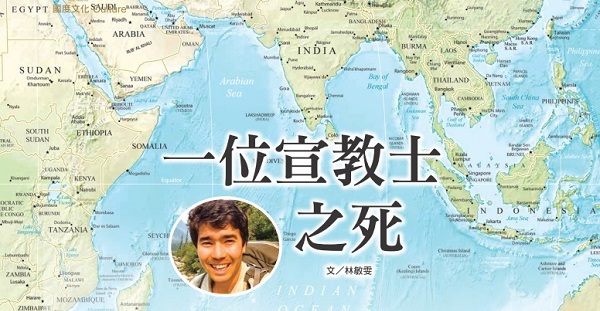death of a missionary

Walking among silver waves
On November 15, 2018, Chinese-American missionary John Allen Chau (or translated as John Zhao) asked fishermen to take him close to North Sentinel Island (North Sentinel Island) in the Bay of Bengal in the Indian Ocean, hoping to contact the isolated people. Sentinelese, preaching the gospel to them. When he saw the Sentinelese people on the shore, he shouted, "My name is John. I love you; Jesus loves you."
However, the other party's reaction was to crossbow and bow. John fled.
He had been preparing for this moment for a long time. John Zhou has a first aid license, has preached the gospel through youth football camps in South Africa, and also received language training. In order to prevent outside bacteria from being introduced into this group, many vaccinations are also given.
Even though the first contact did not get the positive response he expected, he did not give up and approached the island again later that day. This time when they got ashore, John walked among the tribesmen, sang hymns, and began to preach. Some tribesmen even listened quietly.
Just like the plot of the movie "The Mission", the missionaries climbed up the steep cliff after all kinds of hardships and came face to face with the aboriginal people holding spears and arrows... But at this moment, there was no melodious flute sound, but a sudden sound. A boy fired his bow and shot an arrow at the Bible that John was holding up. He fled again.
That night, John poured out his fear, confusion, and frustration in his diary: "What makes them so defensive and hostile?... I'm scared... I don't want to die..." But he also knew his mission very well: "In order to show them Preach Jesus, it's all worth it." He asked Jesus to forgive those who wanted to kill him because "they might do it." Finally, he signed "Soli Deo Gloria (Glory to God Alone)."
The next day, John rowed a small boat to the island, and his straight back disappeared among the silver waves. A few days later, fishermen found his body on the shore.

▲Five missionaries who were martyred in Ecuador in 1956. (https://goo.gl/images/yLBHDJ)
Throw sharp words
After the incident, news and online media around the world rushed to report it. There have been many comments both inside and outside Christianity, compared with the history of five missionaries, including Jim Elliot, who were stabbed to death with spears while contacting the Oka people in Ecuador in 1956. John Chow's death may be praised as "martyrdom", or condemned as "ignorance"; his determination to reach out to "unreached peoples" may be seen as fulfilling the Great Commission, or criticized as imperialism; some people affirm that He wanted to convey the hope of eternal life, but some people denied him and thought that he would only bring diseases to the indigenous people.
In the more than 60 years since Eliot's martyrdom, the great mission entrusted by Christ to "make disciples of all nations" has not changed. Mission to different cultures has become a research topic in seminaries and missionary societies. Today, few missionaries use paratroopers to enter the "threshing field" with bare hands. Instead, they preach by living and working with the local people, and using their lives to influence lives.
The death of missionary John Zhou has triggered heated discussions and questions about the All Nations missionary organization to which he belonged, the evangelicals’ persistence in missions, and even the meaning of missions themselves.
In today's social media era where everyone can speak, regardless of religious background, the general public has spoken out one after another, throwing sharp or heavy responses. Even without a clear understanding of John Zhou’s own experience and preparations for the trip, some people have ridiculed him for going on the expedition just to post photos on Instagram.
On the occasion of the loss of their loved ones, the Zhou family declares to forgive those who killed John, and at the same time asks everyone to understand and respect John and his family.

▲In order to preach, John Zhou received many different trainings. (https://goo.gl/images/3h2NYd)
Bearing sorrow with kindness
In the comments, many Christian media and Christian individuals expressed harsh opinions on the death of John Zhou. How can believers bear to blame someone when their limbs are mutilated? Should we treat with kindness before discussing right and wrong? He is not only a missionary, but also our brother.
"Three of Job's friends... came from their own place to grieve for him and comfort him. ... They lifted up their eyes and looked at him from a distance... and burst into tears. ... And they sat with him on the ground for seven days and seven nights. , and no one spoke to him, because he was in agony." (See Job 2:11-13)
These friends did speak later, either reproaching or admonishing. But before that, they came to Job's side, grieved for him, and stayed with him for seven days and seven nights. Although what they said after that might not be entirely wise or reasonable, at least before that, they comforted him with silence.
Missionary John Zhou’s preaching style is indeed worthy of reflection and discussion by Christians. But before commenting, can we grieve for him and comfort his family with silence?
What motives do Christians have for commenting on the death of missionary John Chow? In a sharp-tongued Internet culture, are Christians influenced to dance with it, or are the winds of kindness blowing? As a follower of Christ, shouldn’t we pause, reflect, pray, and think twice before speaking – is this correct, necessary, and merciful?
God’s words clearly tell us that He is the Lord of mercy and compassion. This word carries not only tender sympathy but also firm empathy—“The Lord is near to the brokenhearted.” (Psalm 34:14) “Surely He has borne our sorrows and carried our sorrows.” (Isaiah) 53:4)
Did we ever get close to his family? Have you ever sympathized with their sorrow? Have you ever shared the grief of losing a loved one with them?

▲The missionaries rowed towards the island, heading towards the mission among the silver waves.
Missionaries speak out
Perhaps missionaries are needed to speak for missionaries.
在尼泊爾設立「克西馬尼禱告殿」及「燕巢兒童中途之家」(Gethsemane Prayer House and Swallow’s Nest Children’s Home,https://swallowsnestministries.org/)的陳克銘(Clement Chen,參閱本刊40期〈Bringing Heavenly Father’s Heart to Nepal〉),在臉書上如此回應各方評論:
"Honestly, it feels like we see John Chow more as a thing, an ideal, an idea, rather than a flesh-and-blood person. Before judging his actions, we should love him as our brother. Why? When someone is grieving, we still want to invade his and his family’s privacy and criticize his behavior. Is it more important for us to explain what happened and express our opinions, or to have love for others?”
The missionaries Pastor Wei and his wife, who have served in Asia for 40 years and just retired and settled in the United States in 2018, believe that John Zhou’s experience is worthy of evaluation by missionary scholars from a gentle, kind and objective perspective. However, before that, we must first see that this is a young man who is completely committed to God, devoted without reservation to the mission of making disciples of all nations, and obeys the command to love the world without hesitation; his love for Christ is undeniable.
They also emphasize the importance of teamwork. The only way to make good use of the missionary's passion and courage, which is the most precious resource, is to support the missionaries who go to the field with wise spiritual guidance.
Pastor Wei reminded: "Only God knows John Zhou's motives, and we are not God." From a human perspective, it seems that a young life was sacrificed in vain. But God is in control and He will work through the body of Christ.
Have you and I ever thought about how missionary family members need to face the possibility of losing them while supporting their loved ones to respond to God’s call? How do they balance their mentality? Mrs. Wei said that supporting her husband’s service with prayers is a practice and experience of trusting God. Both she and her children have experienced answers to their prayers, so they firmly believe that staying behind is a way to participate in God’s ministry and share the blessings her husband has received.
Pastor Wei and his wife would like to convey their comfort to John Zhou's family: "You can be grateful for the beautiful memories left by John. He is a fearless warrior, he is not afraid of death; he knows where he will go when the time comes."
Arrive safely on the other side
The song "Christ Is Mine Forevermore, by CityAlight" by the Australian worship band "City Alight" says this:
I am like a stranger walking on the narrow road of pilgrimage,
Bear the hurt and hatred for the name of Christ.
Full of military uniform, experienced in battle without injury,
He has promised to arrive safely on the other side.
Mine are days here as a stranger,
pilgrim on a narrow way.
One with Christ I will encounter,
harm and hatred for his name.
But mine is armor for this battle,
strong enough to last the war.
And he has said he will deliver,
safely to the golden shore.
Missionary John Zhou followed the commandments of loving God and loving others and bravely carried out the Great Commission. As a result, he suffered hurt, hatred, and even paid the price with his life. It may seem like a futile effort to the world, but he has reached the other side.
As followers of Christ, how should you and I treat others with kindness so that we can live a life of loving God and loving others?
 Loving missionaries begins with understanding the Great Commission
Loving missionaries begins with understanding the Great Commission
Interview with Herald Martin, President of the Florida Evangelistic Association (FEA)
Before taking over the chairmanship of FEA, a missionary organization with a history of more than 70 years, in 2016, Pastor Mahro served for 14 years at Missionary Flights International (MFI), providing airlift for more than 400 missionary organizations in the Caribbean. supplies. He came into contact with many missionaries and saw their life on the field at close range.
When he learned about the death of missionary John Zhou, his first thought was of Eliot and others who were martyred 60 years ago. He read from many messages that John Zhou actually received a lot of training before going on a missionary trip, and it was not a lack of preparation as described by some media. Mahro believes that just because he has an adventurous spirit, he should not be dismissed as an explorer and his motives should not be underestimated.
Mahro said that John Zhou is indeed a risk-taker, and his approach breaks away from tradition. But missions are inherently risky and require transcending frameworks.
Before FEA sends missionaries into the field, it emphasizes respecting local culture and customs, earnestly instructs missionaries on what they can and cannot do, and reminds them how to advance and retreat safely in real and fierce spiritual battles. FEA has a care department in which the responsible pastors regularly contact the missionaries to give them the opportunity to talk, pay close attention to the challenges they encounter in life, and provide all-round counseling and consultation. Mahro said that ordinary believers often think of missionaries as superhuman Christians, but in fact they are just ordinary people who also have problems with marriage, finances, depression, etc.
Therefore, he encouraged Christians to support missionaries not only by sending checks, but also by conveying care for them and their families through emails, videos, cards, packages, etc., and more importantly, by watching and praying for them. Caring for the whole person of the missionary is an expression of love.
Seeing the various criticisms against John Zhou both inside and outside Christianity, Mahro felt sad but not surprised. He mentioned that a survey released by Barna Group in 2018 showed that 51% church members did not know the term "Great Commission"; among those who knew, only 17% could clearly explain the meaning of the Great Commission. He said, if there is no teaching or emphasis in the pulpit, how can the congregation value the Great Commission, let alone respect the missionaries who practice the Great Commission?
Mahro pointed out that after the resurrection, every time the Lord Jesus appeared to his disciples, he would mention forward action. For example, “Go and make disciples of all nations” (Matthew 28:19), “Go into all the world” (Mark 16:15), “Preach to all nations” (Luke 24:47), “I am sending you.” (John 20:21), “bearing witness to the ends of the earth” (Acts 1:8). The church needs to more carefully understand the mind of Jesus and be more active in managing the missionary culture and lifestyle. Start locally, such as transporting neighbors to church, providing language assistance to new immigrants, etc. If God allows, He will send Christians to different corners of the world.
During his tenure at MFI, Mahro met an elderly man from Chicago, George Knoop. After the earthquake in Haiti in 2010, Knopp was called to put aside his successful career and comfortable environment to serve. In addition to assisting in the administrative affairs of missionary organizations, he also taught local people to acquire skills. Unfortunately, he was killed in a violent attack locally in 2014.
When Mahro brought the news to Knopp's sisters, he felt their pain deeply. However, they were well aware of Nope's intentions and even stated that this was a result commensurate with his commitment.
He said earnestly and sincerely that missionary missions will inevitably encounter dangers and Christians will inevitably be persecuted. This is what the Lord Jesus predicted and it is also a fact that happens all over the world. Just like the five young missionaries who lost their lives in Ecuador 60 years ago and later inspired many people to carry out the Great Commission, he believed that John Chow's martyrdom for missionary work seemed tragic, but God could still bring about good results.
Pastor Mahro encouraged: "Christians are either sent or sending people. When followers of Christ know more about the Great Commission, they will know better how to love missionaries."
Further reading
‧The Life and Death of John Chao, the Man Who Tried to Convert His Killers, www.theguardian.com/world/2019/feb/03/john-chau-christian-missionary-death -sentinelese?CMP=share_btn_link)
‧From Jim Elliot to John Allen Chau: The Missionary-Martyr Dilemma, www.christianitytoday.com/ct/2018/november-web-only/john-allen -chau-jim-elliot-missionary-martyr-dilemma.html)
‧Family of US missionary John Chau: We forgive tribe for Killing him, www.nbcnews.com/news/world/family-us-missionary-john-chau- we-forgive-tribe-killing-n939276)
‧〈51% of Churchgoers Don't Know of the Great Commission, Barna Group, www.barna.com/research/half-churchgoers-not-heard-great-commission/)
 Linda Pang, writer, Sunday school teacher, loves to study and share God’s words.
Linda Pang, writer, Sunday school teacher, loves to study and share God’s words.
